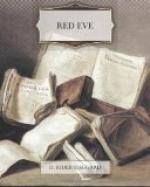Now all talk was hushed and every eye turned to scan these strangers of whose business, it would seem, something was already known.
“A fine man,” said one lady to another of Hugh, “but why does he come here in dinted armour?”
“Oh! he is English and the English are barbarians who like to be ready to cut some one’s throat,” answered her companion. “But Holy Jesus! look at the long fellow with the death’s head who walks behind him, and carries his luggage in a sack. His face makes my back creep.”
Fortunately neither Hugh nor Dick understood these and other such sayings which Sir Geoffrey repeated to them afterward and therefore walked on with their host unconcerned. Once, however, Grey Dick nudged his master and whispered in his ear:
“Be glad, our man is here. It is he who mocks us to those popinjays. Nay, turn not to look; you will see plenty of his sweet face presently.”
Now they stood before the chair of state, from which the Doge rose, and advanced two steps to greet the Ambassador of England. When these courtesies were over Sir Geoffrey presented Hugh to him, to whom he bowed, and Dick, whose salute he acknowledged with a wave of his jewelled hand. Afterward they talked, all crowding round to listen, Sir Geoffrey himself, who spoke Italian well, acting as the interpreter.
“You come hither, Cavalier de Cressi,” said the Doge, “on behalf of his royal Grace, King Edward, who speaks of you in his letter in terms of which any knight may well be proud. We understand that this captain with you is your companion,” and he glanced curiously at Dick out of the corners of his dark eyes, adding, “If those are gifts which he bears in that leathern sack and the long case in his hand, let our servants relieve him of them.”
“Let his servants leave me alone,” growled Grey Dick when this was translated. “Say to this fine lord, Sir Knight, that the gifts in the sack are not for him, and that which the case scatters he would scarcely care to have.”
Sir Geoffrey made some explanation in a low voice, and with a smile the Doge waved the matter by, then said:
“Will the noble cavalier be so good as to set out his business, unless it is for our private ear alone?”
Hugh answered that it was for the public ear of all Venice, and especially for that of the lord who was called Sir Edmund Acour in England, the Count de Noyon in France, and the Seigneur of Cattrina in Italy.
“Will you pleased to point out this lord to us,” said the Doge, glancing at the gorgeous throng which was gathered behind them.
“I cannot, illustrious Doge,” answered Hugh, “that is, with certainty. As it chances I have seen his face but twice—once in a marsh when I had other things to think of who must watch my enemy’s sword, and once at eve in the corner of a dark chapel, where he had just gone through the rite of marriage with a lady whom he had drugged, which lady was my affianced wife. Often afterward I sought to see that face, especially in the great fray of Crecy, but failed, in a case which with your leave I will narrate to you.”




